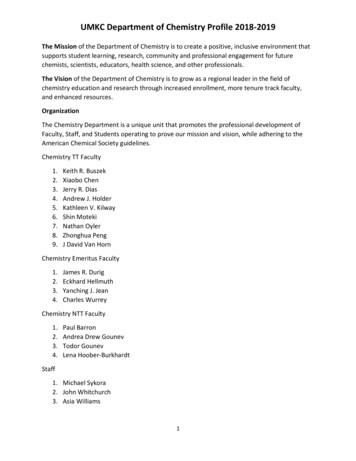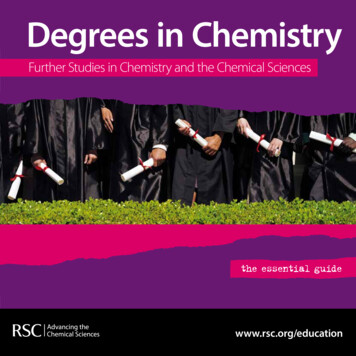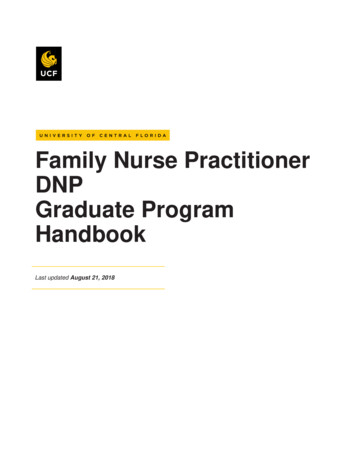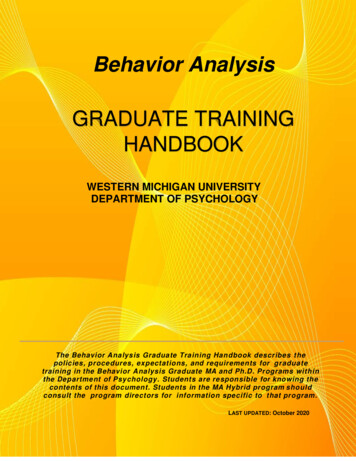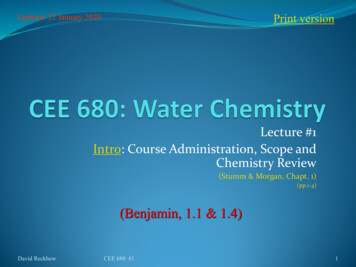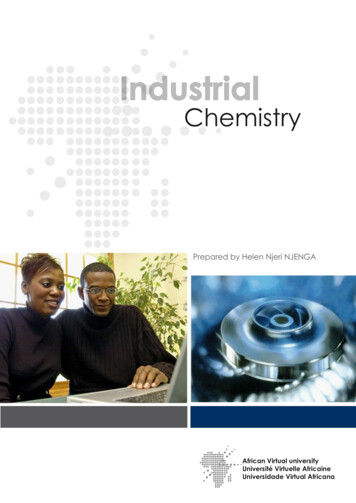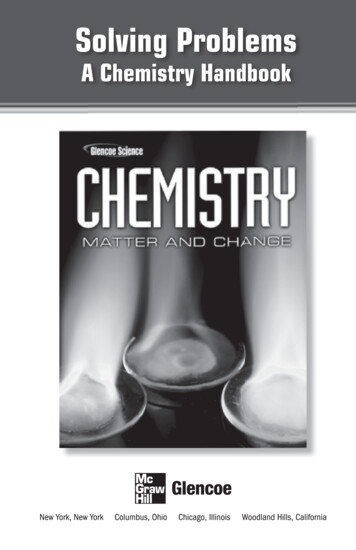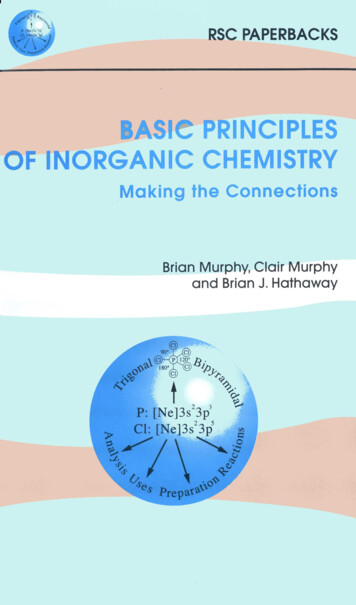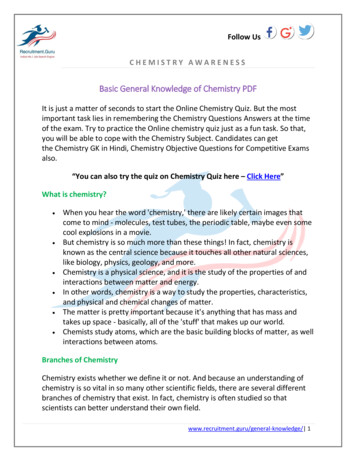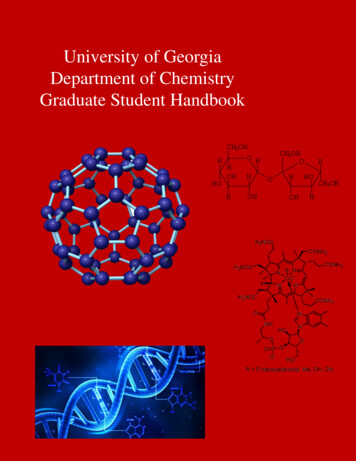
Transcription
University of GeorgiaDepartment of ChemistryGraduate Student Handbook
Chemistry Graduate Student HandbookCHEMISTRY GRADUATE STUDENT HANDBOOKThis document summarizes the requirements for the Ph.D. and M.S. Degrees in Chemistry at TheUniversity of Georgia (UGA) and provides schedules and checklists for completing these requirements.Deadlines are given in semesters, which should be interpreted as "non-summer semesters after enteringgraduate school at UGA," unless otherwise noted.The primary reference for rules and regulations regarding graduate students is The University of GeorgiaGraduate Bulletin. This Department of Chemistry handbook summarizes some of the more importantrules from the Bulletin and clarifies their application for Chemistry students. Additional rules above andbeyond those specified by the Graduate School are also outlined here, especially those regardingspecific course requirements and deadlines. Questions regarding these requirements may be referred tothe Graduate Coordinator or to the Graduate Program Administrator. If further information is required,the Graduate Coordinator or the Graduate Program Administrator will contact the Graduate School onyour behalf.Requirements for the Ph.D. DegreeEach graduate student will be advised by the Graduate Coordinator during their first year until aresearch advisor is chosen. Any questions concerning these requirements should be addressed first tothe research advisor (if one has been chosen) and then to the Graduate Coordinator. Students shouldbecome familiar with the Graduate School requirements in the Graduate School Bulletin.Selection of a Research AdvisorEntering graduate students are encouraged to acquaint themselves with all the various researchopportunities available in the department as soon as possible so that they can complete their selectionof a research advisor, i.e. the Major Professor, by the end of the first semester in residence. Studentsshould review the faculty research interests to gain an overview of current work in the Department ofChemistry.During the first semester in residence, each student is required to attend at least one seminar per week.To gain exposure to the available research possibilities, students can attend a seminar in any one of thefour divisional areas (Analytical, Inorganic, Organic, Physical), or a departmental colloquium, during theirfirst semester. Each student is required to meet with at least three faculty members before selection ofa research advisor. Each of these faculty members will sign a form (see attachment) that must be turnedin to the selected research advisor, who must be a member of the Graduate Faculty. The student mustchoose a research advisor by the end of the first semester in residence.See Selection of the Major Professor
Student Advisory Committee and the Program of StudyIn consultation with the research advisor, an Advisory Committee consisting of the research advisor andtwo additional faculty members (all of whom must be members of the Graduate Faculty) must bechosen by the end of the second semester in residence to develop a Program of Study for the student.The Program of Study must include: (a) at least 3 hours of 9300; (b) at least 20 hours of letter-gradedgraduate courses (not including 9300) (i.e., 6xxx-9xxx courses; and (c) at least 6 hours of 9000. ThePreliminary Program of Study must be submitted to the Graduate Program Administrator by the end ofthe second semester in residence. Courses taken at other institutions that have similar content to UGAcourses may fulfill major course requirements in Chemistry subject to approval by the AdvisoryCommittee and the Graduate Coordinator. However, such courses do not count toward the required 30hours of resident course credit required by the Graduate School. Doctoral students typically take sixgraded courses of 3 credits each, plus two hours of graded seminar (1 credit each). The specific choice ofclasses to be included on the Program of Study is determined by the student in consultation with theresearch advisor, and must be submitted to the student's Advisory Committee for approval. TheAdvisory Committee should either approve the suggested plan for graduate coursework, or proposechanges at the time the Preliminary Program of Study is submitted. The requirement for 30 hours ofresident coursework normally includes 20 credit hours of graded coursework plus 10 more hours of9000 and 9300.See Advisory Committee for Doctoral Candidates [FORM] and Preliminary Doctoral Program of Study[FORM]Coursework Offered in the Department of ChemistryThe graduate courses typically offered by the Department in each of the four traditional areas ofchemistry are listed below. All graduate chemistry courses listed on a student's Program of Study mustbe passed with a grade of B or better. Consult the Graduate Course Catalog for specific coursedescriptions.Analytical (CHEM 88x0)Chem 8810Chem 8820Chem 8830Chem 8840Chem 8850Chem 8860Chem 8890Inorganic (CHEM 82x0)Chem 8210Chem 8220Chem 8230Chem 8240Chem 8250Chem 8290Organic (CHEM 83x0)Chem 8300Chem 8310Chem 8320Chem 8330Chem 8340Chem 8340Chem 8350Chem 8370Chem 8390Physical (CHEM 89x0)Chem 8920Chem 8930Chem 8940Chem 8950Chem 8960Chem 8990Courses Offered Outside the Department of ChemistryPh.D. students may include graduate courses outside the Department of Chemistry on their Program ofStudy to allow for exposure to a broader base of advanced or interdisciplinary subject matter. Coursesoffered by departments other than Chemistry may be listed on the student's Program of Study, as long2 Page
as they are approved by the student's research advisor and Advisory Committee. For the Ph.D. degree, amaximum of two of the six required graduate courses may be taken outside the Department ofChemistry. Any graduate course taken outside the Department of Chemistry and listed on the student'sProgram of Study must be passed with a grade of B or better. The six graduate courses required for thePh.D. degree should normally be completed by the end of the fourth semester in residence.SeminarsEach Ph.D. student must register for the appropriate section of CHEM 8120-8150 (seminar) every nonsummer semester in residence. Furthermore, each Ph.D. student must give three departmentalseminars. The first two of these seminars must be given and letter-graded as part of CHEM 8120-8150,and the student must receive at least a B grade on each. The grade that is assigned for the seminarcourse will be based on attendance and participation in discussion of the seminar topics presented. TheGraduate Coordinator’s Office will keep track of all passed seminar presentations.One of these first two seminars should be on the student's research project, and the other must be on aliterature topic unrelated to the student's research project or any other projects going on in thestudent's research group. The topic for this literature seminar must be approved in advance by thefaculty member in charge of the seminar program. The third seminar is given as part of the Final Defense(see below).Research ProspectusBy the end of the third semester in residence, each Ph.D. student will meet with their AdvisoryCommittee to present a "prospectus" of their research. The research prospectus should describe aspecific project or projects that a student plans to undertake for his or her Ph.D. thesis research. Theprospectus presentation allows an opportunity for the Advisory Committee to become familiar with thestudent's research goals and plans, and to provide useful suggestions.The research prospectus should include clear written and oral presentations of:1. The hypothesis to be tested or the gap in knowledge to be investigated.2. A succinct review of the background research/knowledge from the literature that forms thebasis for the hypothesis/knowledge gap.3. The experimental or theoretical approach(es) to be used in testing the hypothesis or closing theknowledge gap.Consultation with the major professor during formulation of the prospectus is strongly encouraged.The research prospectus must be presented both in writing (limited to 10 typed pages, double-spaced)and orally (a 20-minute planned presentation interspersed with questions from the committee) at ameeting of the Advisory Committee to be held by the end of the third semester in residence. This istypically one semester before a student would hold his/her preliminary oral exam for admission to Ph.D.candidacy. (Note: The Graduate School requires both a research prospectus and a preliminary oralexamination for admission to Ph.D. candidacy.) The written prospectus should be given to the members3 Page
of the Advisory Committee two weeks prior to the oral prospectus presentation. Successful completionof the research prospectus requires approval by all but one member of the Advisory Committee.Note that the prospectus is not a list of required experiments that, once performed, automaticallyentitles the student to a Ph.D. degree. Research is by nature exploratory and, therefore, its outcome isunpredictable. Furthermore, the quality of the research is not addressed in the research prospectus. Themajor professor and the Advisory Committee remain the final judges of what constitutes an acceptablePh.D. dissertation.See Approval Form For the ProspectusPreliminary Examination and Admission to CandidacyThe preliminary examination, which constitutes the written and oral comprehensive examinations, asdefined by the Graduate School, must be completed, and passed, by the end of the fourth semester inresidence. The student should select a date for the preliminary oral examination in consultation with hisor her Advisory Committee. NOTE: At least two weeks in advance of the oral preliminary examination,the student must provide the date, time, and place of the exam to the Graduate Program Administrator,who will forward this information for announcement on the Graduate School website. Students cannotdo this themselves. This must be done through the Graduate Program Office. An approved AdvisoryCommittee form and an approved Final Program of Study form must be on file with the Graduate Schoolprior to this announcement.The written portion should be given to the members of the Advisory Committee two weeks prior to theoral comprehensive exam presentation.The written comprehensive examination consists of a progress report on the dissertation research andan original research proposal, not directly related to the research project (see Guidelines for WrittenComprehensive Examination). In the oral comprehensive examination, the student presents and defendsthe original research proposal and may also be questioned on the research progress report and/or basicknowledge in his/her major area. Passage of the preliminary examination requires approval by at leastall but one member of the Advisory Committee. Failure to pass the preliminary examination will result ina mandatory change of degree objective to the master’s level. M.S. Students who have failed their oralpreliminary examination may not apply for readmission to the Ph. D. program after completion of theM.S. Degree. Admission to candidacy forms should be submitted to the Graduate Program Administratorimmediately after the successful completion of the preliminary examination. At least 30 hours ofconsecutive resident coursework must be completed before a student may be admitted to candidacy.See Final Program of StudyDissertation and Final Defense (Oral Examination)After admission to candidacy, the student must register for at least 5 hours of coursework in each of twosemesters to be eligible for graduation. An application for graduation must be filed with the GraduateSchool no later than Friday of the second full week (the first full week for summer) of classes in thesemester of the anticipated graduation date. Following the completion of the research project, the4 Page
student must submit to the Graduate School a dissertation acceptable to the Advisory Committee. Thestudent then orally defends the dissertation before the Advisory Committee. The defense consists of aformal seminar immediately followed by questioning by the Advisory Committee. This defense is opento the public. NOTE: At least two weeks in advance of the final defense, the student must provide thedate, time, and place of the exam to the Graduate Program Administrator, who will forward thisinformation for announcement on the Graduate School website. Students cannot do this themselves.This must be done through the Graduate Program Office. Failure to properly notify the Graduate Schoolin advance of the date of the final defense could jeopardize the validity of the Final Defense.Maintenance of Good StandingThe Graduate School Bulletin states: "students may be dismissed by their department at the end of anysemester if they have not made sufficient academic progress to warrant continuance of study" and "Acandidate for the doctoral degree who fails to complete all degree requirements within five years afterpassing the comprehensive examination, and being admitted to candidacy, will be required to take thecomprehensive examinations again and be admitted to candidacy a second time."Students need to stick to the deadlines mentioned in the handbook for each of the ‘benchmarks’. Ifthese deadlines are not met and there is no reasonable excuse, students will fall out of good standingwith the department, and their assistantship can be revoked.The assurance of continued support via a research assistantship (RA) or teaching assistantship (TA)requires maintenance of "good standing," which includes all of the following:1. Fulfilling all program requirements on schedule (cf. the Checklists below).2. Maintenance of at least a 3.0 cumulative GPA overall and in graduate Chemistry classes. TheGraduate School Bulletin states "Students with a cumulative graduate course average below 3.0for two consecutive terms are placed on academic probation by the Graduate School. They thenmust make a 3.0 or higher semester graduate average each succeeding semester that theiroverall cumulative graduate average is below 3.0. These students are no longer on probationwhen their cumulative graduate average is 3.0 or above. If they make below a 3.0 semestergraduate average while on probation, they are dismissed."3. Receiving "Acceptable" (or better) ratings in each task of each course for which GLAperformance was evaluated in the most recent semester in which GLA duties were performed.4. Receiving an "S" grade for any GRSC 7770 course taken within the last year.5. Receiving at least one "S" grade in CHEM 7000/9000 in the previous two semesters (applies tostudents beyond their first year).6. For international students, meeting the university's language requirements to be certified forteaching within one calendar year of admission.7. Completing a degree in a timely manner. The expected time for a full-time student to completean M.S. degree is 3 years, while that for a Ph.D. is five years. Unless studies are interrupted byextenuating circumstances, these degrees should be completed no later than one year beyondthese expected times. The Graduate Curriculum Committee, in consultation with theDepartment Head, will evaluate any extenuating circumstances.5 Page
8. Adhering to UGA’s academic honesty code, “A Culture of Honesty.” An official finding ofacademic dishonesty against a chemistry graduate student by a University panel causes thestudent to lose their good standing.Checklist(For deadlines, "semester" means "non-summer semester after entering graduate school at UGA." Allcompleted forms should be forwarded to the Graduate Program Administrator.)First Year1. Meet with Graduate Admissions Committee to select first-semester courses the week before thestart of the first semester.2. Meet with three or more faculty members to discuss research options; get signatures onSelection of Major Professor form during the first semester.3. Have selected research advisor sign Selection of Major Professor form by the end of the firstsemester.4. Select Advisory Committee; submit Advisory Committee for Doctoral Candidates form by theend of the second semester.5. Submit Preliminary Doctoral Program of Study form by the end of the second semester.Second Year1. Schedule and present the Prospectus to the Advisory Committee. Have the Advisory Committeesign the Prospectus form by the end of the third semester.2. Give first graded seminar by the end of the fourth semester.3. Distribute a one-paragraph abstract summarizing the independent research proposal for thepreliminary examination to the Advisory Committee for their approval (this can be convenientlyaccomplished via e-mail) no later than six weeks before the exam date.4. Submit Final Doctoral Program of Study form to the Graduate School through the GraduateProgram Administrator before the preliminary examination.5. Schedule the date for the preliminary oral examination with Advisory Committee. At least twoweeks in advance of the oral preliminary examination, provide the date, time, and place to theGraduate Program Administrator, who will forward this information to the Graduate School sothat an announcement can be placed on their website. An approved Advisory Committee formand an approved Final Program of Study form must be on file with the Graduate School prior tothis announcement. The preliminary examination must be taken and passed by end of thefourth semester.6. Distribute the written independent research proposal and research progress report for thepreliminary examination to Advisory Committee at least two weeks before the oral exam.7. When the announcement of the preliminary examination has been received by the GraduateSchool, the Report of the Written and Oral Comprehensive Examination form will be placed inthe student's mailbox. This form should be taken to the preliminary examination for theAdvisory Committee to complete. After the preliminary examination, the student should returnthe completed form to the Graduate Program Administrator, who will forward it to theGraduate School.6 Page
8. Submit the Application for Admission to Candidacy form after fulfilling the following criteria: Final Doctoral Program of Study approved. Grade Point Average of 3.0 or better. Preliminary examination passed. 30-hour coursework requirement met. Advisory Committee confirmed and notified.Third Year and Beyond1. Give the second graded seminar by the end of the third year (i.e., the sixth non-summersemester after entry).2. File the Application for Graduation form with the Graduate School no later than Friday of thesecond full week (the first full week for summer) of classes during the semester the studentplans to graduate. The Graduate School strictly enforces this deadline!3. Submit completed dissertation to the research advisor for approval before distributing this tothe Advisory Committee.4. Distribute dissertation to Advisory Committee at least two weeks in advance of the Final OralExamination.5. Schedule the date for the Final Oral Examination with the Advisory Committee. At least twoweeks in advance of Final Oral Examination, provide the date, time, place, and title of thedissertation to the Graduate Program Administrator who will forward this information to theGraduate School for announcement on their website. Failure to provide this information couldjeopardize the validity of the Final Defense.6. Present and defend the dissertation in the Final Oral Examination [no more than one AdvisoryCommittee members may disapprove of dissertation].7. Make any suggested changes to the dissertation and submit the completed Approval Form forDoctoral Dissertation and Final Oral Examination to the Graduate School through the GraduateProgram Administrator immediately after Final Oral Examination or after suggested changes aremade.8. Submit the final dissertation to the Graduate School for approval. Submit this electronically as a.pdf file according to the instructions on the ETD Submission Form on the Graduate Schoolwebpage by the end of the semester in which the Final Oral Examination was taken.9. Register for at least three hours of coursework during the semester of graduation. Complete allrequirements and have all forms filed with the Graduate School at least one week prior toGraduation.Guidelines for Written Comprehensive ExamEach Ph.D. student must pass a preliminary examination to be admitted to candidacy for the Ph.D.degree. This examination consists of two distinct parts: (a) a written independent research proposal anda written research progress report; and (b) an oral defense of these documents including oral answers toquestions raised by the student's Advisory Committee. These guidelines relate to part (a), whichconstitutes the written comprehensive examination. The written proposal and progress report should be7 Page
distributed to the student's Advisory Committee at least two weeks before the scheduled preliminaryexamination.Independent Research ProposalEach Ph.D. student must write an original, independently conceived proposal for a research project notdirectly related to the student's dissertation research. The purpose of this exercise is to demonstratethat the student can identify a significant and timely scientific question, and synthesize a researchstrategy designed to answer this question. The proposal will be evaluated for creativity, feasibility, andsignificance of the research goals. The student is also expected to be familiar with the background of theselected research topic. The topic must be approved by the Advisory Committee, as set forth in theChecklist: Ph.D. Program/second year above. The research proposal should be no longer than 10 pagesof double-spaced text. Figures, tables, references, and other graphical material are not included in thislimit and should be used to efficiently convey information.The format of the proposal should use the following sections in the indicated order adhering to theindicated page limits: Summary (0.5 pages):o A brief summary of the proposal stating the goals of the proposed research and theexperimental approach to achieving them.Background and Significance (2 pages):o A description of the current state of the chosen research area, concentrating on anygaps in current understanding that this proposal is designed to fill. The significance ofthe research question being addressed should also be discussed.Proposed Experiments (6.5 pages):o A detailed description of the experiments proposed, including instrumentation orprocedures used, and how the results would be analyzed and interpreted.Chances of Success (1 page):o An evaluation of the experimental protocol, possible outcomes, and the overall chanceof successful completion of the proposed experiments. The most difficult or challengingparts of the proposed study should be identified and discussed.Research Progress ReportEach Ph.D. student must write a report describing the progress made to date on their dissertationresearch project. This allows the committee to evaluate the student's understanding of the researchpursued and the student's research progress. The progress report should be no longer than 10 pages ofdouble-spaced text. Figures, tables, references, and other graphical material are not included in thislimit and should be used to efficiently convey information.The format of the progress report should use the following sections in the indicated order adhering tothe indicated maximum page limits: Abstract (0.5 pages):8 Page
A brief summary of the goals of the research project and the progress that will bediscussed.Background (1.5 pages):o A description of the current state of this research area, concentrating on any gaps incurrent understanding that your project is designed to fill.Goals (1 page):o A summary of the specific goals of the research project and the significance of reachingthese goals (i.e., how will science be advanced if these goals are achieved?)Experimental Approach (5 pages for this and next section):o A discussion of the experimental approaches being used to accomplish the researchproject. This should represent an "outline" of the thesis project from start to finish.Progress:o A summary of work accomplished to date on the research project, including articlespublished and presentations given. Included in this section should also be a discussion ofthe future directions of the project.o Faculty Involvement in Graduate Student Preparation of Written ComprehensiveExaminationThe written comprehensive examination (consisting of the research progress report and independentresearch proposal) is designed to evaluate the student's intellectual creativity and writtencommunication skills. As such, direct involvement of the faculty Advisory Committee with preparation ofthese documents should be minimized. The following guidelines will be enforced: Advisory Committeemembers may not: suggest the specific topic, technique, or molecular system to be considered in the independentresearch proposal. Suggestions about the general area of the proposal are acceptable.direct the development of the project in the independent research proposal. When consulted bythe student, they may provide factual information only.see any version of the independent research proposal prior to its distribution to the entirecommittee (at least two weeks before the preliminary examination).attend an oral presentation of the contents of the written comprehensive examination beforethe preliminary exam.Recommended Courses for the First Year of StudyAll first-year graduate student TAs must register for the Chemistry-specific GRSC 7770 (TA training)during their first fall semester.Analytical ChemistryFallChem 8810 (3 hours) Mass SpectrometryChem 8860 (3 hours) Advanced Analytical ChemChem 8xx0 (3 hours) Non-Analytical Chem ElectiveChem 81x0 (3 hours) SeminarSpringChem 8820 (3 hours)Chem 8850 (3 hours)Chem 8xx0 (3 hours)Chem 8150 (3 hours)ElectrochemistryAnalytical SpectrometryNon-Analytical Chem ElectiveAnalytical Seminar9 Page
* The following courses are taught in alternate years and can be substituted for any of the coursesabove: CHEM 8840 (3 credits), Surface and Thin Film Analysis (fall semester, even years)CHEM 8830 (4 credits), Electronics (spring semester, odd years)CHEM 8890 (3 credits), Nanomaterials: Engineering and Characterization (fall semester, oddyears)Inorganic Chemistry [Inorganic Track]FallChem 8210 (3 hours) Chemical Applications ofGroup TheoryChem 8230 (3 hours) Main Group Chemistryoffered odd years; take 2ndfall if necessaryChem 8xx0 (3 hours) Non-Inorganic Chem ElectiveChem 81x0 (1 hour) SeminarInorganic Chemistry [Bio-inorganic Track]FallChem 8210 (3 hours) Chemical Applications ofGroup TheoryChem 8250 (3 hours) Bioinorganic Chemistryoffered even years; take 2ndfall if necessaryChem 8xx0 (3 hours) Non-Inorganic Chem ElectiveChem 81x0 (1 hour) SeminarBcmb 6010 (3 hours) Biochemistry and MolecularBiologyBcmb 8010 (4 hours) Advanced Biochemistry andMolecular Biologyone of BCMB 6010, 8010 oran equivalent Biochemistrycourse is a pre- or corequisitefor CHEM 8250Organic Chemistry [Synthetic Track]FallChem 8300 (3 hours) Organic StructuresChem 8310 (3 hours) Organic MechanismsSpringChem 8220/L (3/1hours)Chem 8240 (3 hours)Chem 8xx0 (3 hours)Chem 8120 (1 hour)SpringChem 8220/L (3/1hours)Physical Methods inInorganic and BioinorganicChemistryoffered even years; take 2ndspring if necessaryTransition Metal Chemistryoffered odd years; take 2ndspring if necessaryNon-Inorganic Chem ElectiveInorganic SeminarChem 8xx0 (3 hours)Chem 8120 (1 hour)Physical Methods inInorganic and BioinorganicChemistryoffered even years; take 2ndspring if necessaryTransition Metal Chemistryoffered odd years; take 2ndspring if necessaryNon-Inorganic Chem ElectiveInorganic SeminarSpringChem 8320 (3 hours)Chem 8340 (3 hours)Organic SynthesisOrganic SpectroscopyChem 8240 (3 hours)10 P a g e
Chem 8xx0 (3 hours)Chem 81x0 (1 hour)Non-Organic Chem ElectiveSeminarChem 8xx0 (3 hours)Chem 8130 (1 hour)Non-Organic Chem ElectiveOrganic SeminarOrganic Chemistry [Computational Track]FallChem 8300 (3 hours) Organic StructuresChem 8310 (3 hours) Organic MechanismsChem 8xx0 (3 hours) Non-Organic Chem ElectiveChem 81x0 (1 hour) SeminarSpringChem 8330 (3 hours)Chem 8350 (3 hours)Chem 8xx0 (3 hours)Chem 8130 (1 hour)Molecular ModelingPhysical OrganicNon-Organic Chem ElectiveOrganic SeminarOrganic Chemistry [Bio-Organic Track]FallChem 8300 (3 hours) Organic StructuresChem 8310 (3 hours) Organic MechanismsChem 8xx0 (3 hours) Non-Organic Chem ElectiveChem 81x0 (1 hour) SeminarSpringChem 8340 (3 hours)Chem 8350 (3 hours)Chem 8xx0 (3 hours)Chem 8130 (1 hour)Organic SpectroscopyPhysical OrganicNon-Organic Chem ElectiveOrganic SeminarPhysical ChemistryFallChem 8930 (3 hours) Intro Quantum ChemSpringChem 8920 (3 hours)Chem 8940 (3 hours) Chemical KineticsChem 8210 (3 hours) Chemical Applications ofGroup TheoryChem 8960 (3 hours)Chem 8xx0 (3 hours)Thermodynamics/StatisticalMechanicsMolecular Spectroscopy*Non-Physical Chem ElectiveChem 8990 (3 hours) Lasers in ChemistryChem 81x0 (1 hour) Seminar*Requires 8210 and 8930 as prerequisite.Chem 8140 (1 hour)Physical SeminarRequirements for the M.S. DegreeEach graduate student will be advised by the Graduate Coordinator until a research advisor is chosen.Any questions concerning these requirements should be addressed first to the research advisor (if onehas been chosen), then to the Graduate Coordinator. Students should become familiar with theGraduate School requirements in the Graduate School Bulletin.Selection of a Research AdvisorThe guidelines are the same as those for the Ph.D. program.Student Advisory Committee and Program of StudyIn consultation with the research advisor, an Advisory Committee consisting of the research advisor andtwo additional faculty members (all of whom must be members of the Graduate Faculty) must bechosen by the end of the sec
chemistry are listed below. All graduate chemistry courses listed on a student's Program of Study must be passed with a grade of B or better. Consult the Graduate Course Catalog for specific course descriptions. Analytical (CHEM 88x0) Inorganic (CHEM 82x0) Organic (CHEM 83x0) Physical (CHEM 89x0) Chem 8810 Chem 8210 Chem 8300 Chem 8920
